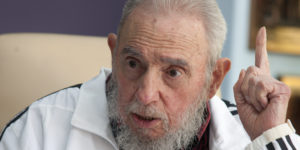It’s been said of prominent world leaders that single acts result in what would be written about them in their obituary.
For Fidel Castro, such an act that no doubt will appear in obits around the world must read, “… who took the world to the brink of nuclear annihilation.”
The Cuban dictator is dead at the age of 90. He outlasted 10 American presidents in one of the more peculiar political standoffs of the past century.
But it was a two-week span in October 1962 that remains the lynchpin of Castro’s reign of the island nation that sits just off the tip of Florida. He allowed Soviet engineers to build missile launch platforms in Cuba capable of sending nuclear-armed missiles against the United States or anyone else in the hemisphere. U.S. spy planes spotted the installations; President Kennedy got wind of them. The president then went nose-to-nose with Castro and his Soviet benefactors.
The Cuban missile crisis ended when the other side “blinked” after Kennedy ordered a complete naval blockade of the island and he did that after advising the nation in a televised address that any strike from Cuba against any nation in the hemisphere would be met by the full force of the U.S. nuclear arsenal.
Castro led a “revolution” in 1959 that overthrew a hideous dictator. Cubans thought they were being liberated from repression. They were mistaken. Castro’s repression was every bit as severe. His fellow Cubans suffered economic deprivation, loss of human rights and dignity, imprisonment, loss of liberty across the board.
Despite all that, the continued economic sanctions imposed by the United States stopped making sense a long time ago, especially after the Soviet Union evaporated in 1991. The Cubans themselves never did pose much of an economic or military threat to this nation.
President Obama finally moved to end the embargo and restored a semblance of normal relations Cuba.
Still, Fidel Castro’s legacy will not be a glowing one.
Obama’s remarks in response to Castro’s death were appropriately neutral. As the Washington Post reported: “We know that this moment fills Cubans — in Cuba and in the United States — with powerful emotions, recalling the countless ways in which Fidel Castro altered the course of individual lives, families, and of the Cuban nation,” Obama said in a statement. “History will record and judge the enormous impact of this singular figure on the people and world around him.”
Enormous impact? Powerful emotions? Singular figure? Yes to all of that. Indeed, in the Little Havana area of Miami, they’re celebrating Castro’s death. I certainly would call that a “powerful emotion.”
So it is that this individual finally has departed the scene.
My feelings are a bit mixed. I am glad the United States has lifted its economic sanctions against Cuba. Still, the world is better off without Fidel Castro.
So long, El Comandante.
